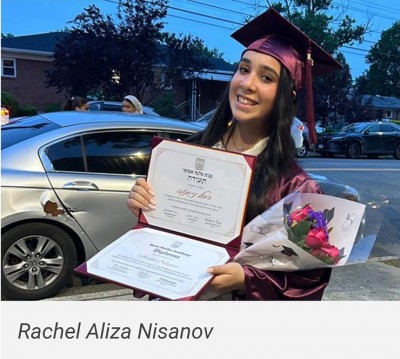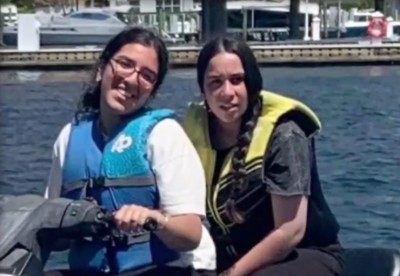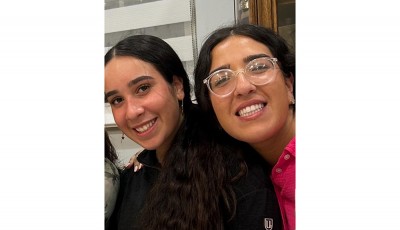


On Tuesday, August 12, 2025, the Queens Jewish community was struck by devastating tragedy. Thirteen-year-old Rachel Aliza bas Ora “Racheli” Nisanov, a”h, lost her life in a jet ski accident in Fort Lauderdale, Florida, while riding with her 16-year-old sister, Aviva Bracha. The girls had been in Florida with their family celebrating Racheli’s graduation from Bnos Malka Academy, with high school at Shevach set to begin in September.
Their father, Rabbi Shlomo Nisanov, jumped into the water despite not knowing how to swim, tearing his hands as he tried to pull both daughters to safety. Aviva was rushed to Broward Health Medical Center in critical condition, where she continues to fight for her life. Doctors worked on Racheli for hours, but the pure soul of a young girl was called back to Heaven. The Florida Fish and Wildlife Conservation Commission has opened an investigation, but for her family and community, no answers can ease the loss.
The very next evening, August 13, the Bukharian Jewish Community Center in Forest Hills became the site of one of the most heartbreaking funerals Queens has ever seen. Thousands crowded inside and outside; thousands more watched the Kaykov TV livestream. Community leaders, rabbanim, dignitaries, classmates, and friends came to mourn, their voices breaking under the weight of grief.
Rabbi Yakov Nasirov of Congregation Bet El opened with words about kindness being the one language that binds all humanity. “My daughter told me what stood out about Racheli: she loved me. That was her language—love and kindness.”
Rabbi Yosef Akilov of Shaarei Eliyahu shared a memory from his own father: “When young people are taken, it is because each of us is responsible for each other. We must ask ourselves—how can I be a better me? How can I give more to my community?” He reminded the mourners that this was not only the Nisanovs’ pain but the pain of all Queens.
Rabbi Itzhak Yehoshua of the Bukharian Rabbinical Council called the tragedy a wake-up call. He recalled a midnight phone call from a woman with seven children who felt life was no longer worth living. “When life is treated as unimportant, Hashem sometimes takes the most precious souls to remind us of its worth. Every day we wake up is a chance to make this world better.”
Rabbi Menashe Tzadka of TOV Beit Midrash spoke of parents as guardians entrusted with a soul. “When the Owner asks for it back, we return it with love,” he said, comparing the loss to other families who buried children before their weddings or in youth. “Some missions are completed in only a few years.”
A Russian rabbi addressed the mourners in his native tongue, offering words of comfort to the many Bukharian and Russian-speaking families in attendance.
A longtime close family friend, who has worked with the Nisanovs on community projects for nearly four decades, spoke of standing shoulder to shoulder with them through every cause. “We should not be silent,” he said, invoking Aharon’s silence. “Cry out in their pain. Hold them up with our love.”
Rabbi Nerya Aminov of Ner Mordechai drew on the Navi, describing how Hashem reassured the Jewish people of His unconditional love, even after their sins. “All the love in the world—between eight billion people—comes from Hashem. His love is beyond our imagination. Leaders especially must take this moment to pray harder, teach more purely, and give more honestly.”
Rabbi Igal Haimoff of Yeshiva Ohel Simcha spoke of his own loss of a grandchild. “There are three partners in every child,” he said. “The main thing is to return the soul as pure as it came. Hashem gives big challenges to big people. As painful as this is, her soul is now in the highest place.”
Rabbi Max, known to the family and community, stood and repeated the simple truth: “There are no words. But look around. We are a special people. Genuine people, genuine love. Even in grief, that must bind us together.”
Then the siblings came forward, their voices piercing through the sobs of the crowd. Yonah, the eldest brother, spoke of his decision weeks ago to strengthen his bond with her despite their age gap. “She never just babysat—she washed dishes, cleaned floors, gave her whole self. She was Hashem’s gift for 13 years.” Another brother said through tears: “All I wanted was one more minute with her. We plan careers and vacations, but none of it can buy a single moment with the ones we love. Go home, hug your children, and say, ‘I love you.’ Be present.”
Eli, another brother, held up a note Racheli had written to herself. On it was a simple checklist—and at the bottom, a plea: “Hashem, everything is going to be okay, right?” In purple pen, she had answered herself: “I think so.” The note, in her young handwriting, broke the crowd into sobs.
Finally, her father rose. With his voice raw from weeping, Rabbi Shlomo Nisanov thanked Hashem for the years he was given with his daughter. He offered gratitude to those who moved heaven and earth to help: Congresswoman Grace Meng, Rep. Jared Moskowitz, Mark Rosenberg and Florida askanim who ensured halachic dignity, Eli Rowe and Hatzolah Air, Queens Shmira, NYPD, Deputy Chief Richie Taylor, Joel Eisdorfer, Menashe Shapiro, Council Member James Gennaro, and countless others. He smiled through his tears as he recalled her unique birthday: “7-8-9-10-11—born on Shabbos, the eighth child, in the ninth month, on the tenth day, in 2011.” Then he declared, “I still have eight children. She will always be my daughter. People who believe have no questions. People who don’t believe have no answers.”
When the aron was lifted, Queens Shmira and NYPD guided the funeral procession to JFK, Deputy Chief Taylor once again at the family’s side. Three times the community begged forgiveness from the nifteres, as is our custom, before she was placed on a flight to Jerusalem to be buried beside her grandfather. It was what she had wished for when visiting Eretz Yisrael.
In the days that followed, vigils and Tehillim gatherings were held across Queens and Florida. Social media carried the grief under the hashtags #RachelAlizaNisanov and #PrayForAviva. News outlets from the New York Post to ABC7 reported the story. A Chesed Fund campaign organized by the Zirkiev family on behalf of Kehilat Sephardim of Ahavat Achim has already raised over $136,000 from more than 1,500 donors, easing the family’s financial burden of medical costs, funeral arrangements, and transport to Israel. Donors left notes like “With love,” and one bereaved family wrote: “In memory of our son Aharon Yitzchak—may their souls rise together in Olam Haba.”
Racheli lived just thirteen years, but those years overflowed with kindness, humility, and faith. She never complained, never demanded, always gave. She was the glue of her family—the youngest child who drew everyone closer. Her siblings remember her sparkle, her quiet strength, her way of giving more than expected. Her community remembers her as a pure soul whose very presence lifted others.
Her legacy now calls us to live differently: to hug our children more tightly, to put down our phones, to tell our families “I love you,” and to do acts of chesed in her memory. From the rabbanim came the message: life is fragile, life is sacred, and each of us must take upon ourselves a measure of growth. From her father came gratitude and faith even in the ashes. From her own note came a whisper: “It’s going to be okay, I think so.”
May her pure soul be a melitzat yosher for her parents, siblings, and all of Klal Yisrael.
Yehi zichrah baruch. HaMakom yenachem eschem b’soch sha’ar aveilei Tzion v’Yerushalayim.
By Shabsie Saphirstein
Heartbreaking Farewell: The Life & Legacy Of Rachel Aliza Bas Ora “Racheli” Nisanov, a”h
Typography
- Smaller Small Medium Big Bigger
- Default Helvetica Segoe Georgia Times
- Reading Mode




